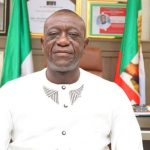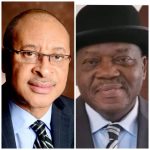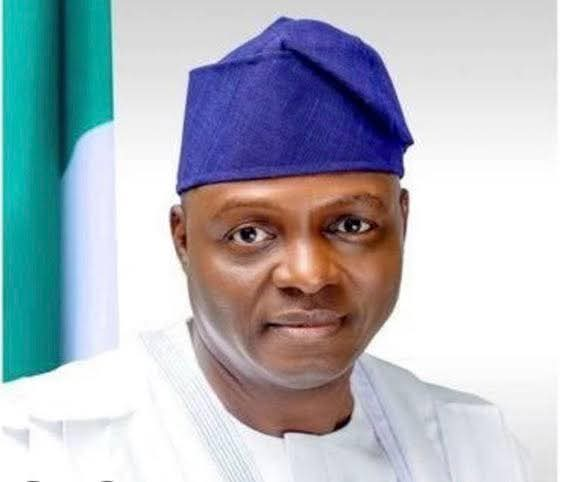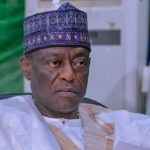Yilwatda’s Emergence as APC National Chairman Quells Speculation of Tinubu-Shettima Rift, Strengthens Zoning Harmony.
By Bala Salihu Dawakin Kudu Democracy Newsline Newspaper.
August 3, 2025.
In a strategic move widely interpreted as both symbolic and political, the All Progressives Congress (APC) has elected Nentawe Yilwatda as its substantive National Chairman. His emergence has significantly eased growing speculation over an alleged rift between President Bola Ahmed Tinubu and Vice President Kashim Shettima, particularly rumours suggesting the President might consider dropping Shettima as his running mate in 2027.
Before Yilwatda’s emergence, the political space had been buzzing with conjecture. The appointment of Ali Bukar Dalori from Borno State—Vice President Shettima’s home state—as acting chairman following Abdullahi Ganduje’s resignation, stirred debate and further fueled whispers of internal party discord. Critics pointed to this development as indicative of President Tinubu’s shifting political calculations ahead of the next general elections.
However, the election of Yilwatda, a technocrat and former governorship candidate from Plateau State in the North Central, is now being widely viewed as a stabilizing force within the party. Not only does it reassert APC’s commitment to regional zoning, but it also restores a geographical and religious balance that is likely to benefit the party electorally and structurally.
Yilwatda’s ascension is seen as a corrective move, restoring the party’s leadership configuration to an equilibrium that reflects Nigeria’s political diversity. With President Tinubu from the South-West, Vice President Shettima from the North-East, and now Yilwatda from the North Central, the APC appears to have achieved a balanced geopolitical triangle—an important signal of internal stability and national inclusivity.
Beyond regional politics, Yilwatda’s Christian faith introduces a religious diversity to the topmost ranks of the APC, which has come under heavy criticism for its Muslim-Muslim presidential ticket in 2023. In North Central states like Plateau, Benue, and parts of Kogi and Niger—areas with strong Christian demographics—his presence at the top of the APC hierarchy may soften the narrative and broaden the party’s appeal heading into 2027.
Reacting to speculations of a crack between Tinubu and Shettima, a close associate of the President strongly dismissed the claims, calling them “a calculated attempt by the opposition to sow discord within the APC.”
“There have been rumours about a frosty relationship between the President and the Vice President, but these are unfounded. If there was any real problem between them, it would be known within the top ranks of the party. This narrative is a distraction, and the people behind it are only trying to divide the APC,” the source stated.
This clarification is echoed by many party loyalists who argue that the party’s latest leadership arrangement, particularly the selection of Yilwatda, is a move to fortify internal unity and dismiss any claims of disharmony at the top.
It’s important to note that the North Central played a significant role in President Tinubu’s electoral victory. Despite strong opposition campaigns that sought to use the religious ticket as a wedge, voters in the region turned out in large numbers for the APC. By ensuring that the National Chairman slot remains in the North Central—following the resignation of Abdullahi Adamu from Nasarawa State—the party honours that support.
“The North Central deserves this position. They helped deliver victory, and now they have been duly recognised. This is about equity, justice, and rewarding loyalty,” said a party chieftain.
Yilwatda’s Christian identity not only mollifies religious concerns but also provides the APC with a credible figure to help consolidate gains and navigate the complex socio-political dynamics of the Middle Belt, especially as the next general elections draw closer.
Analysts agree that this latest development increases the likelihood that Vice President Shettima will retain his place on the 2027 ticket, thus ending speculation about a change. It also strengthens his standing as the undisputed political leader in the North-East, a region that remains pivotal for any presidential victory.
The South-South, another important region, is currently represented at the apex of legislative leadership through Senate President Godswill Akpabio. This completes a delicate but deliberate political balancing act designed to maintain party cohesion across Nigeria’s diverse landscape.
The APC’s decision to elect Nentawe Yilwatda as its National Chairman is more than a routine leadership change—it is a reaffirmation of the party’s strategic zoning formula, a move to douse internal tension, and a bold step to dispel rumours of a Tinubu-Shettima fallout. It also highlights the party’s efforts to project inclusivity and address previous criticisms.
Going into 2027, this recalibration places the APC on a stronger footing. With key regions adequately represented and the leadership space more balanced, the ruling party can now focus on governance and consolidating electoral strength, rather than battling internal speculation……
Bala Dawakin Kudu contributed to this article and can be reached via email at balasalihudawakinkudu@gmail.com or by phone at +2348060017934.










